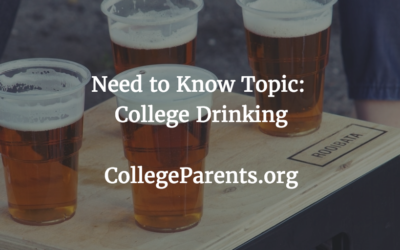
The first six weeks of college are dangerous territory for new freshmen. Today we want to bring attention to a need to know subject for college parents that speaks to what we know about college drinking.
According to the National Institute on Alcohol Abuse and Alcoholism, “drinking at college has become a ritual that students often see as an integral part of their higher education experience. Many students come to college with established drinking habits, and the college environment can exacerbate the problem. According to a national survey, almost 60 percent of college students ages 18–22 drank alcohol in the past month,1 and almost 2 out of 3 of them engaged in binge drinking during that same timeframe.2”
Although alcohol isn’t the number-one cause of death for college students — car accidents are the single biggest killer — but drinking can still be deadly. With thanks to an article published by Allianz Tuition Insurance,
Here’s what concerned College Parents need to know.
1. Some parents think college drinking is perfectly OK.
Many parents are surprisingly untroubled by alcohol usage on campus, and some even encourage it. “We have seen parents bring beer and alcohol into the residence halls for their children, “according to a University of Minnesota seminar on college drinking. Other parents “complain that University staff and law enforcement personnel are wasting time and harassing their children when they issue citations to students for alcohol use.”
These parents may believe that having a permissive attitude toward college drinking will help their kids in the long run. Everything in moderation, right? Wrong. Alcohol researcher Caitlin Abar from Pennsylvania State University studied 300 teenagers at home and then in the first semester of college. Abar found that teens whose parents tolerated underage drinking were more likely to engage in college binge drinking. However, “parents who disapproved completely of underage alcohol use tended to have students who engaged in less drinking, less binge drinking, once in college,” Abar told NPR. In short, the “protective effects” of strict parenting stayed with the teens even after they left home.
 2. Drunk driving is still a major risk, even if your student doesn’t have a car on campus.
2. Drunk driving is still a major risk, even if your student doesn’t have a car on campus.
Some parents believe that their children are safe once they’ve moved into the residence halls, because having a campus-centered social life will prevent them from drinking and driving. It is true that college campuses overall are safer and more protective environments. College student death rates from suicide and alcohol-related reasons are much lower than the mortality of 18- to 24-year-olds in the general population.3
However, drunk driving is still a danger. Each year, an estimated 4.86 million students between the ages of 18 and 24 drive under the influence of alcohol, according to data from the National Institutes of Health. And about half of vehicular deaths involving college students are alcohol-related, the UVA study found.
3. College drinking leaves few students unscathed.
There’s an old saying: “Nothing good ever happens after midnight.” This is especially true on college campuses when students have been drinking.
Each year, according to the National Institutes of Health:
• an estimated 599,000 students are unintentionally injured while under the influence.
• an estimated 696,000 students are assaulted by another student who has been drinking.
• an estimated 97,000 students are victims of alcoholrelated sexual assault or date rape.4
Even if your child is lucky enough not to be injured or attacked while under the influence, college drinking often has other negative effects. About one-quarter of college students report suffering academic consequences because of drinking, such as missing class or getting bad grades.
4. College students don’t know as much as they think they do.
Even if your child has had some experience with drinking before going to college (and more than two-thirds have5), he probably doesn’t understand the full impact alcohol abuse can have. Does he understand what it means to black out? Does he know how to recognize alcohol poisoning?
Don’t assume your student is already educated about the risks of drinking. Your student may try to blow you off by claiming he knows everything already. Don’t believe him; but don’t patronize him, either. Pennsylvania State University researcher Rob Turrisi offers a helpful script: “You probably already know quite a bit. It would make me feel better if we talked it through. Besides, it would help me to better understand how things are different from when I was your age.”
5. Talking to your student about drinking does make a difference.
Don’t delay the big talk about drinking at college. Parents can minimize teens’ college drinking if they discuss alcohol before their children enter college, Turrisi says.6 Here are some tips for having effective conversations with your child about college drinking and alcohol abuse.
Try asking indirect, impersonal questions. You already know that angrily demanding, “Are you drinking?” will get you nowhere. Instead, start a conversation by asking things like, “Do a lot of kids in your dorm drink?” or “What do most students do on the weekends?”
Rehearse common college-drinking scenarios. Ask your daughter what she would do if she found another young woman passed out in a bathroom, or if a drunk friend insists on driving her to a party.
Don’t glorify your own college drinking days. If you used or abused alcohol in college, it’s OK to be honest about it. It’s not a good idea, however, to treat it like a joke or tell funny stories about your own drunken antics.
Finally, just be there for your new college student. Check in regularly, try not to nag too much, and listen to your child with an open mind. Here’s to a safe freshman year!
CitationsDrugFree.org
NIH.gov
CDC.gov
PennState.edu
Thank you to AllianzTuitionInsurance for contributing this post to College Parents of America.



